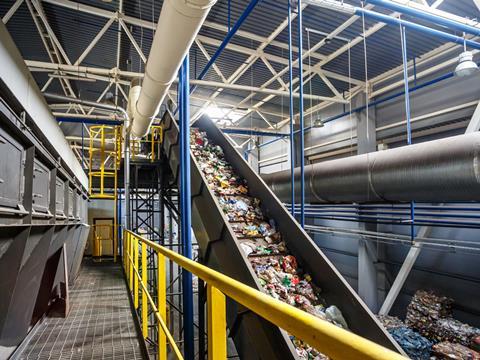
Plastics converter representative EuPC has responded to PlasticsEurope’s call for a 30% recycled content target for plastics by 2030, claiming that this would place the risk solely on plastic converters instead of sharing responsibility across the value chain.
On Thursday, PlasticsEurope, which represents plastics manufacturers in Europe, outlined its call for a mandatory target of 30% for recycled content in packaging on the European market by 2030. This announcement from PlasticsEurope followed revisions to the Packaging and Packaging Waste Directive (PPWD), with the group welcoming the legislation but adding that it viewed the 30% target as essential for the transition to a circular economy.
In its response, EuPC says that it acknowledges the specific 30% recycled content target as “legitimate and achievable” but adds that this requires responsibility to be “shared by the whole value chain”. EuPC claims that PlasticsEurope’s suggested target will force plastic converters – who, it adds, are PlasticsEurope’s customers – to shoulder the risks of structural change in the plastics industry.
EuPC outlines the potential challenges that it claims may arise from the mandatory 30% target set out by PlasticsEurope. Renato Zelcher, president of EuPC, comments: “The introduction of product-related mandatory recycled content threatens supply bottlenecks. As long as recyclates required by the market are not yet available in sufficient quantities and qualities, there is a big risk of quality impairments and marketing bans for our plastic packaging.
“In the food packaging sector, for example, the technical and legal prerequisites for the use of recycled materials are not yet in place. This would seriously jeopardise the economic existence of thousands of medium-sized plastics processors and packaging users in Europe and their investments into circularity.”
In his statement, Zelcher adds that what he sees as fair and holistic solutions are in development: “To safeguard against supply bottlenecks, plastics producers should be obliged to put a correspondingly high proportion of recyclates or circular polymers on the EU market. Legal substitution quotas for virgin plastics are also the means of choice for this.”
EuPC goes on to say it cautions against “ideological blinkers” as new technologies, and new competition, emerge. The group claims it recognises the potential of chemical recycling for sorting mixed and contaminated waste streams and for meeting supply gaps with recycled materials of virgin quality.
According to EuPC, chemical recycling represents “the most ecological and economic solution” to the issue of “fair competition” and, it adds, “should be recognised as soon as possible” by the European Union.
The response from EuPC also includes its warning that the plastics industry should avoid relying on future technologies to address current challenges. Elaborating on this, Alexandre Dangis, managing director at EuPC, says: “In order to make the closing of the cycle as economical and climate-efficient as possible, we mainly rely on the further expansion of established mechanical recycling in the packaging sector through appropriate design-for-recycling and high-quality collection and sorting of waste.
“Under no circumstances should efforts to expand separate collection and design-for-recycling be pushed back in the hope that new technologies will make them obsolete in the foreseeable future.”
Going forward, EuPC says that circularity is a “shared responsibility” and responses across the plastics industry should reflect this. According to Zelcer: “We therefore call for a fair distribution of legal obligations along the value chain and a recognition of chemical recycling by the EU and national authorities.”
The group also appears to discourage what it considers pre-emptive and premature targets, with Dangis adding: “The European Commission has not yet put forward a proposal for recyclate use quotas, but is currently examining various regulatory approaches to increase recyclate use. A first proposal is expected by the end of the year at the earliest.
“We demand that all approaches are subject to an unbiased scientific impact assessment in order to avoid economic damage as well as ecological mistakes.”
EuPC’s response concludes: “Plastic converters are open to further discuss and work with polymer producers and all relevant stakeholders in the months to come in combination with the ongoing work of the EU Commission.”













